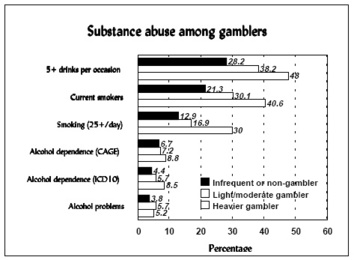Research has consistently demonstrated that problem gamblers have elevated rates of substance abuse compared to non-problem gamblers. In addition, patients in treatment programs for substance abuse have high rates of problem gambling. A recent telephone survey* of 2,016 randomly selected Ontario adults reexamined the issue of substance abuse among problem gamblers. Smart & Ferris measured substance abuse using a variety of methods. Alcohol use was assessed using measures of 1) binge drinking (5+ drinks on any one occasion in the past year), 2) alcohol dependence (CAGE and ICD10 scales), 3) alcohol problems (individual was considered to have an alcohol problem if answering yes to at least 2 items from a 5-item scale asking about friendships, health, home life, work and finances), and 4) alcohol use by volume (not shown on chart). Tobacco smoking was measured by asking about 1) current smoking status, and 2) having ever smoked 25 or more cigarettes per day. Levels of gambling were classified by expenditure. “Heavier gamblers” had spent $50 or more, “low or moderate gamblers” had spent less than $50, and “infrequent or non-gamblers” had spent nothing in the past 30 days. This study found that heavier gamblers did not report significantly more alcohol problems than others, measured either by alcohol problems or the two alcohol scales. However, they did binge drink and smoke heavily (25 or more cigarettes per day) significantly more than others. Compared with others, significantly greater percentage of heavier gamblers were smokers in the past year. The variety of substance abuse measures in this study allows a closer look at the issue of comorbidity among gamblers. Heavier gamblers may spend more time in environments where binge drinking and heavy smoking is acceptable. Although these behaviors are adversely affecting their health, heavier gamblers were not detected to be more alcohol dependent than others. This study suggests that routine substance abuse (alcohol and tobacco) screening of gamblers and problem gambling screening of substance abusers in health care settings is a sound policy decision.
Source: *Smart, R.G., & Ferris, J. (1996). Alcohol, drugs and gambling in the Ontario adult population, 1994. Canadian Journal of Psychiatry, 41, 36-45.
This public education project is funded, in part, by The Andrews Foundation.





